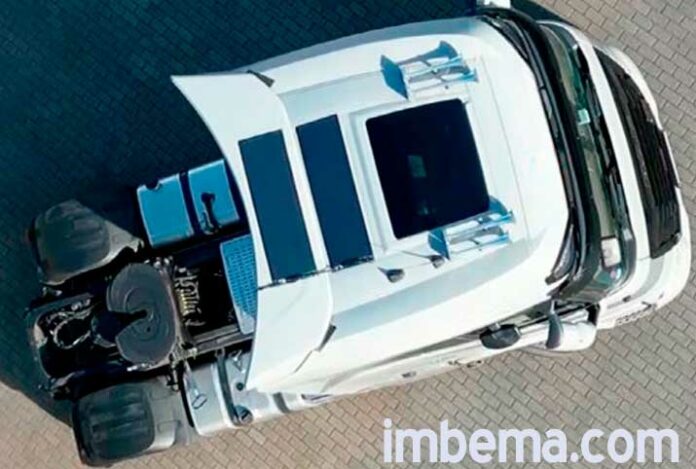Green Energy Solar Systems — solar panels for commercial vehicles. Suitable for trucks, buses, vans and trailers.
Green Energy’s thin, flexible CIGS solar panels have been developed for commercial vehicles such as trucks, vans, trailers and buses. They use CIGS technology (Copper, Indium, Gallium and Selenium). Unlike rigid panels, these solar panels are wafer-thin, flexible and lightweight. This makes them virtually invisibly mountable on curved surfaces such as cabin roofs and spoilers. Another major advantage is that CIGS solar panels are virtually insensitive to vibrations and also provide reliable power in cloudy weather.
Imbema in Nieuwerkerk aan den IJssel supplies Green Energy solar panel sets with charge controller, cabling, glue and installation instructions. The sets can be installed plug-and-play on virtually any vehicle within four hours. The range starts with a 110Wp model, designed for the roof of a truck. This set ensures that the starter battery is charged and thus supports the electrical systems. For tractors that often change trailers, there is a 165Wp version. Vans require heavier sets of 160Wp to 240Wp; depending on consumption. For trucks and trailers, there are sets up to 960Wp available. This means that, for example, stationary air conditioners, cool boxes and electric pump trucks can be used independently of the engine. Systems such as telematics also continue to work reliably, independently of the on-board network.
The power in a vehicle normally comes from the dynamo, which is driven by the combustion engine via a belt. However, power from solar panels does not cost any fuel. The result is that the dynamo does not have to work as hard, or does not even have to supply power at all. This reduces fuel consumption. In addition, you can generate power while the engine is not running. A practical test at transport company Samat International shows that trucks with solar panels consume an average of 6.9% less diesel. This amounts to 1,478 litres of fuel per truck per year. Good for a cost saving of around €1950, a payback period of less than a year and a CO2 reduction of almost 4 tons.
Vehicles that are regularly stationary or in which drivers spend the night benefit the most. Thanks to the constant charging, idling for power supply is no longer necessary.





